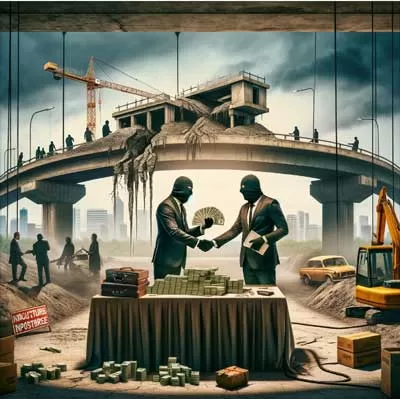The issue of electoral bonds, at its core, legitimizes a favour expected by those who cannot otherwise merit it. Thus, it embodies an act of corruption. While the Supreme Court provided legitimacy to the method, it somehow failed to examine the core issue. Now, this oversight has been overturned, but not without breaking the code of secrecy, as skeletons have come tumbling out.
Let us talk about the most talked-about infrastructure and construction major, namely Megha Engineering & Infrastructure Ltd (MEIL). MEIL is the second-largest construction company after L&T. It is estimated that MEIL will close FY 2024 with a topline of Rs 35,000 crore, a net worth of Rs 24,000 crore, and an order book of over Rs 2,00,000 crore, with 44% of the orders pertaining to the irrigation and drinking water segments. MEIL is focusing on diversifying its order book, with new orders from hydrocarbons and roads contributing over 50% of new order inflow. Also, over 43% of the new order inflow in fiscal 2023 was from the Central Government or Public Sector Units.
Megha Engineering contributed Rs 966 crore to the purchase of electoral bonds, and the timing of the purchases indicates that they could be quid pro quo for getting construction contracts! This is a complete mockery of the procurement system. The managing director of AFCONS had gone on record, before the contract was awarded, to state that the Zojilla tunnel (being built at the cost of Rs 4,500 crore in J&K) would be an impossible win for anyone given the uncertain terrain that surrounds the project.
Megha bagged the contract in the same year it bought the electoral bonds. It further bought electoral bonds worth Rs 140 crore and won the Rs 14,400 crore contract for the Thane-Borivali twin tunnel project passing under the Sanjay Gandhi National Park in Mumbai just a month later. MEIL was the only firm whose bid was found eligible by the planning agency, MMRDA, for the tunnel project. Only L&T and MEIL had submitted technical bids at the opening. MEIL was the lowest bidder for ‘Package 1’, and L&T’s bid was the lowest for ‘Package 2’ but was later rejected. Subsequently, L&T moved the Bombay High Court, challenging its disqualification for ‘Package 1’ and asking the court to direct MMRDA to award the company ‘Package 2’. However, the court rejected both petitions. One of the grounds of rejection by MMRDA was that L&T did not submit an experience certificate for both packages and submitted for only one of them!
Despite incurring a loss of Rs 495 crore, Navayuga Engineering donated electoral bonds worth Rs 55 crore, its entire amount, to BJP. Navayuga was recently rapped for its ill-executed Silkyara Tunnel, which collapsed on 12th November 2023, trapping 41 workers for over 16 days. Not only had the company not built the escape tunnel, which was mandated in the terms of the contract, but it also skirted the mandatory environmental impact assessment required for proposed highways exceeding 100 km in length. The Silkyara tunnel, which is part of the 900 km Char Dham project, needed environmental clearance too. But in the race to complete the project before the forthcoming elections, the project was split into 53 separate sections, with none of them over 100 km in length, thereby skirting the environmental impact assessment.
Once consideration passes between two parties to curry favour, compromises begin. The first thing that gets compromised in infrastructure projects is safety. Currying favours for cash or for electoral bonds is not only undesirable but also dangerous. In fact, we should have harsher punishments and punitive action for corruption in infrastructure projects. While I say this, I am not naive to know that this (corruption) has been prevalent in the sector for long and continues even now too. But the reason I am raising this issue now is that the legitimacy of electoral bonds provides the perception to the buyer of the bond that since the buyer has paid for it, the receiver is obliged to offer protection to the buyer even if the payer commits an error or compromises the project. I am also bringing home the point that if your metro rail, your highways, your bridges, and tunnels are being built by people who have offered unofficial consideration to win the contracts, are these projects safe? Will they last?
Pratap Padode is Founder & President of FIRST Construction Council


















